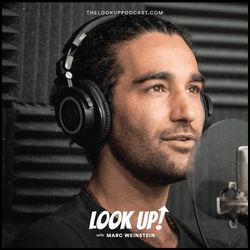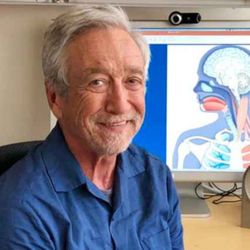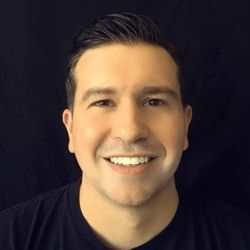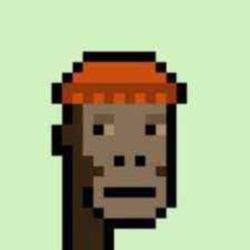Share

The Look Up! Podcast with Marc Weinstein
Part I: Why We Breathe
How can something as simple as breathing impact our health and optimize performance? Famous for his breakthrough contributions within the field of breathing, sighing, and discovering the pre-botzinger complex. Jack Feldman takes us through almost four decades of his career, researching and discovering a process we all take for granted, breathing.
About the GuestJack Feldman is a distinguished Professor of Neurobiology, he also holds a Ph.D. in Physics and is currently teaching at UCLA.
His contributions to understanding the mechanisms of breathing and sighing include the pre-Bötzinger complex and demonstrating the essential role in generating respiratory rhythm in fetal, neonatal, and adult mammals. Jack Feldman’s influence is evident in numerous highly cited reviews, textbooks, and lectures. He was awarded the prestigious Hodgkin, Huxley, Katz Prize of The Physiological Society.
About “what Jack Feldman does”Professor Feldman’s laboratory focuses on the central problem confronting neuroscientists: how molecular, synaptic, and cellular properties of individual neurons in densely interconnected networks result in behaviors ranging from playing the piano to writing a book. Through a unique model system that enables them to perform studies that address this issue, Feldman and his colleagues are able to test their current hypothesis: pacemaker neurons underlie the generation of respiratory rhythm
Episode OverviewIn part one of this episode, we got to speak to Professor Jack Feldman about his research into the field of breathing, sighing, and developing the Pre-Botzinger Complex. Jack broke down his journey of how he got into the research, conducting crazy experiments and took almost a decade trying to convince people of the importance of breaths.
Jack also took a few moments to highlight how a study into brain stems kickstarted his interest in the topic of the brain breath connection.
My Favorite Quotes“You can't do anything interesting if you're afraid of failing and I'm willing to bet that that's something that people in your realm also follow.”
“You make investments, but some of the best investments are the things that might ultimately fail, but they could be spectacular.”
“One of the challenges in science is that the technology progresses and sometimes the technology allows you to answer questions that are very important. You can answer before. The problem with that is that we're under a lot of pressure as scientists to keep producing. And when a new technique comes along, you have to learn it sometimes have to spend a lot of money to get the equipment necessary to do that and that the tracks, your productivity.”
“Just like your car has one engine. We thought there would be a single-engine for breathing. We discovered about 15 years later that there appears to be a second engine and one engine is devoted to generating the inspiratory rhythm and the other is involved in generating rhythm.”
“I realized that the literature was just simply wrong and we embarked upon a series of crazy experiments to try and see if we could localize a site for generating breathing. I wouldn't say much to my surprise that we identified a relatively small spot in the brainstem that seemed to be critical for the generation.”
“You have to be resilient and you have to be persistent. At some point, you have to believe that you have an idea that's worth pursuing. ”
“You have to be careful where you become too much of a believer in an idea because things often, even good ideas get overturned as science progresses, and you have to be able to recognize it.”
Episode Breakdown (Part 1)03:17 - Jack’s most surprising discovery about brain + breath connection
08:30 - Closely held belief of how breath was generated
16:51 - When and why Jack started researching breathing
20:40 - How the study of breathing came about
33:00 - How a scientific peer review could make or break an experiment or theory
Catch the rest of the episode in part 2
Episode LinksProfessor Jack Feldman’s Info
Jack Feldman - Instagram
Jack Feldman - LinkedIn
Jack’s scientific journals - Google Scholar
Jack Feldman’s UCLA Profile and Publications
References made in the episode
Breathing Matters Article
In Search of Memory, Eric Kandel
Marc’s Info
More episodes
View all episodes

17. Managing Tectonic Technological Change
01:11:14||Season 3, Ep. 17The Most Important ThingThe way we really grow and transcend, become better, people, companies, etc. We have to chase that discomfort, that’s how we get to the next level. About GuestEric Pilon-Bignell is a pragmatic futurist and the best-selling author of “Surfing Rogue Waves”, a book that discusses the constant anomaly of change and how humanity is pushed to navigate through this exponential pace of disruption.About “Surfing Rogue Waves”“Surfing Rogue Waves” presented the idea of Disruption as a means of moving forward in the future rather than being overtaken by the “Waves”. In this book, Eric shares how we could shape our life and the future of humanity with our decisions amidst change.Episode OverviewIn this episode, Eric and I discuss the future and the fear it brings for most humans. We touch on certain emerging world conflicts and how we can engage with change at such a massive scale. We exchanged views of the world, happiness, and how we think it will progress after the changes that the pandemic brought.My Favorite Quotes:“We can't put a pin on any one of these because these waves are coming all over, but that kind of equal excitement and fear. I feel that’s where I’m at, I’m so excited about this, there's gonna be so many incredible things.”“My ego was “how do I always do more, how do I increase my peak performance?”“I'm getting my ass kicked on small waves. Right. But, but I'm in the zone. Like I'm locked in, I'm paddling, I'm focused, everything changes. I'm like, I'm intense and it's this really cool mix which we have in life.”“Happiness is how hard it is for you to achieve what you want to get." Episode Breakdown:04:03 - Writing the book during Covid-19 Lockdown05:37 - Eric looking back through his journey, life aspirations, and changes07:35 - Perspective of the future, curiosity and what it could bring14:30 - “A lot of our old fears are almost like, I guess the buzz word, like fake fears now.” The definition of fear in a modern age, violence, famine, etc20:30 - The inequality of wealth and its history in relation to happiness27:40 - South Korea, plastic surgery and the scale of happiness32:25 - The Fourth Industrial Revolution and technological transformation, to do or to die44:38 - What is happiness to Eric?Episode LinksEric's InfoWebsite LinkedInFacebookTwitterProject7Episode ReferencesSurfing Rogue Waves by Eric Pilon BignellVaccine war in the US3D printing organsFuture-Proofing workspace and digital transformation
16. Part II: Why We Breathe
54:25||Season 3, Ep. 16Editors note: This is part 2 of our 2 part episode with Professor Jack Feldman, don’t forget to catch our first episode here. The Most Important ThingWe continue our conversation with Professor Jack Feldman on how he revolutionized our understanding of the neural control of breathing. We dived deeper into the topic of breathing and how it has the ability to change our emotional state. I also get to run a few yoga teachings on the breath by Jack to see how they align (or don’t) with his scientific understanding. About the GuestJack Feldman is a distinguished Professor of Neurobiology, he also holds a Ph.D. in Physics and is currently teaching at UCLA. His contributions to understanding the mechanisms of breathing and sighing include the pre-Bötzinger complex and demonstrating the essential role in generating respiratory rhythm in fetal, neonatal, and adult mammals. Jack Feldman’s influence is evident in numerous highly cited reviews, textbooks, and lectures. He was awarded the prestigious Hodgkin, Huxley, Katz Prize of The Physiological Society.Episode OverviewIn part two of this episode, Professor Jack Feldman shared his thoughts on living through the polio epidemic and broke down of the importance of a vaccine. Besides that, he also shared how his study finds that breathing could affect cognitive functions positively.Jack also took a few moments to highlight the differences in breathing between animals and humans in this episode.My Favorite Quotes“I've been wearing a seatbelt for ever since they became available. I've yet to get in a serious car accident. So you could argue why bother wearing a seatbelt? Well, you wear a seatbelt because the consequences of the rare possibility you get in an accident.”“if you weigh that against the possibility that the vaccine does something negative right now, that data is extremely small. I wouldn't say zero. It's extremely small. And certainly if the odds are 99.999999 in favor.”“One of the ways that the brain consolidates it's information is then when things repeat, it strengthens the connections between neurons.”“If you're less anxious, you're likely to have a longer lifespan if you could maintain it.”“When we think about how breath could be influencing higher function, cognition, or emotion, the signals that are related to breathing can arrive in the brain by a variety of pathways. Every time you expand your lungs, there are receptors in your lungs that become activated. They send signals up into the brainstem, through the vagus nerve.”Episode Breakdown (Part 1)05:10 - Jack’s recollection of the Polio endemic 08:30 - Touching on vaccines and Covid-1913:00 - Neuro scientist on brain functions27:30 - Thoughts on elogating breathing extending lifespans 34:38 - How breathing affects our mental states44:30 - Something that Jack still finds surprising from his research48:06 - A research that Jack personally wants to testEpisode LinksProfessor Jack Feldman’s InfoJack Feldman - InstagramJack Feldman - LinkedInJack’s scientific journals - Google Scholar Jack Feldman’s UCLA Profile and PublicationsReferences made in the episodeThe Science of Breath, Swami RamaBox Breathing TechniqueLight on Yoga, BKS IyengarOverview of Nadi ChannelsAlternate Nostril BreathingMarc’s InfoLook Up! Patreon CommunityLook Up! WebsiteMarc's InstagramMarc's TwitterLook Up! On iTunesLook Up! On Spotify
14. Holy Sh!t We're Alive with Douglas Cartwright Founder of The Daily Shift and Author
01:04:16||Season 3, Ep. 14The Most Important ThingHow does one break away from their Mormon roots, become a millionaire, and lose it all at a very young age just to pick it right back again. Doug talks to us about his journey of reinventions and how changing his perspective in life has brought back positivity in his life. About the GuestDoug Cartwright is the Founder and CEO of The Daily Shifts, an online platform committed to lifelong transformation of the mind, body, and soul. Drawing from his personal experience of introspection and healing, The Daily Shifts is now an app, a master class, and blog that challenges you to be the best version of yourself.His new book “Holy Sh!t We’re Alive?” taps into his life story. A psychedelic journey into meditation, silent retreats, astrophysics, neuroscience, philosophy, and all forms of self-healing. About “Holy Sh!t We’re Alive?”“Holy Sh!t We’re Alive?” is the story of a psychedelic-sparked spiritual journey of an ex-Mormon millionaire. In this book, Doug broke down his journey into meditation, silent retreats, philosophy and all forms of self-healing. Through this journey, he learnt his mistakes, built a new reality and found the purpose of life by shifting his perspective, outlook and beliefs. In Holy Sh!t, We’re Alive, Doug shows you how to live with intention, trust yourself, and show up every day for a meaningful life. You’ll learn mind-blowing facts and important clues to understand your existence and unique contributions. Self-love can be your superpower.Episode OverviewIn this episode, we got to speak to Doug Cartwright about his book “Holy Sh!t We’re Alive?” and how his business, The Daily Shift, came to be. Doug deconstructs his two year journey into discovering spirituality, faith and the universe around him and how that changed his perspective in life. We also got to dive deeper into the chapters of his book to get a bigger picture of how and why it was written as is. Doug also took a few moments to highlight the importance of self love, finding faith and letting go.My Favorite Quotes“A major lesson I learned through it was the beauty of learning to trust my intuition..”“When we zoom out and just kind of realize that just being alive is the ultimate gift. It really takes the pressure off of our daily routine activities.”“If you look across the whole universe, there's nothing even remotely close to earth, but all the spots are a little tiny speck. We got dropped down here and it was like this really wow moment. “It's easier to be told by others what to think and to think for yourself. And it requires, you know, it, to be so vulnerable and kind of wipe your slate clean on. What's true and what's not true. Then rebuild it yourself.”“I'm truly committed to the higher path, to the spiritual path, to truly evolving my soul, to becoming the best version of myself.”“As long as I continue to put my best effort into the world, the universe will take care of me.”“Intuition is a tricky concept that you can’t measure. It’s this weird feeling, almost like a deep knowing feeling. But when you realize it and it opens up to you, you know you’re doing the right thing.”Episode Breakdown05:28 - Trusting one’s intuition08:40 - Doug thinking back at his previous job and the stress that follows10:20 - Doug’s experience during the Ayahuasca ceremony13:44 - Views of life and how every experience is an opportunity 17:45 - Turning a traumatic experience into a life-changing lesson23:11 - Envy, jealousy and desires in a relationship31:17 - To love yourself is to remove pieces that doesn’t fit anymore37:00 - Doug’s view on philosophy and why he decided to write his book41:25 - Managing expectations through gratitude 43:16 - How is success and happiness measured? Doug explained47:14 - Growing up Mormon and leaving the religion54:00 - Finding instant connection within a community 58:28 - Doug’s take on being committed to a higher path through spiritualityEpisode LinksDoug’s InfoDoug Cartwright - Instagram Doug Cartwright - LinkedIn Book - Holy Sh!t We’re Alive: Now What?The Daily Shift WebsiteThe Daily Shift InstagramHoly Sh!t We’re Alive PodcastReferences made in the episodeAyahuasca CeremonyApollo 13 (1995) FilmA Return to Love Book by Marianne WilliamsonMEO-DMT (psychedelics)Mormonism Michael SingerCarl Jung - “beware of unearned wisdom”Alan Watts - “Purpose of life”Marc’s InfoLook Up! Patreon CommunityLook Up! WebsiteMarc's InstagramMarc's TwitterLook Up! On iTunesLook Up! On Spotify
13. Part 2: Manufacturing Molecules with Ben Chiarelli, Foudner & CEO of Cellibre
56:47||Season 3, Ep. 13The Most Important ThingThese days, manufacturing comes with numerous barriers: economic, environmental, and social. Ben talks to us about how Cellibre is revolutionizing the industry using “cellular agriculture” making supply chains efficient and affordable, and prioritising sustainability. About the GuestIn his own words, Benjamin “Ben” Chiarelli is a “founder, investor, adviser, and connector.” Over the past decade, he has worked as a healthcare investment banker for the country’s biggest names, including Deloitte, Jefferies & Company, and J.P. Morgan. He has also been at the helm of teams at Millennium Health, ASCA Design LLC, and Synthetic Genomics, alongside working under movers and shakers in the science world. Drawing from his experience with healthcare investment banking, Ben has founded two of his own companies: private equity firm Divitempus Ventures, as well as cellular agriculture Cellibre.About CellibreFounded in 2017, Cellibre develops cellular agriculture solutions for products that have traditionally had issues scaling production in a sustainable, economic, and high-quality way. Utilising the science of synthetic biology, Cellibre changes and optimizes the cells that produce the target natural product. The cellular agriculture company has pioneered breakthroughs in energy, ingredients, medicines, and more. Their current focus is to use their expertise in the production of pharmaceutical-grade cannabinoids, revolutionizing the way cannabinoid-based medicines are sourced, produced, and consumed.Episode OverviewIn this second half of our chat with Ben, we pick his brain about Cellibre, sustainability, and manufacturing technology that is revolutionizing the industry. Ben deconstructs the science behind cellular technology, particularly as it pertains to cannabinoids. Comparing it to computing, we also talked about the future of technology, genetics, and our instinct for adaptation. With expectations for Cellibre to go commercial later this year, Ben also takes a few moments to highlight the importance of work-life balance, putting people over the company, and how radical it is to have empathy for others.My Favorite Quotes“We have big visions of reinventing how we make things as humanity.”“Don’t think that you have to conquer the world every single day.”“We think about these things (sustainability) really superficially. So, if you think about what nature is, and more fundamentally, what biology is, it’s the world’s most elegant manufacturing tech.”“If you’re thinking about policy, or you’re thinking about business, try and think about it from the perspective of the person who has the least […] Think about it from the perspective of the guy in rural America or the kid in the inner city.”“I want to be able to deconstruct and reconstruct nature in a way that’s sustainable, where we’re not going into the ecosystem to provide human beings with benefit.”“How do we leverage nature to actually keep us sustainable, while at the same time, keeping the planet healthy?”“I always want to help. I always want to get an answer, but sometimes there’s just not one.”Episode Breakdown03:54 - Surrounding yourself with knowledgeable people07:02 - Connecting the technical with the business; hiring people with expertise10:11 - Ben’s role at Cellibre as its founder13:30 - Being a father and a founder: managing time and expectations, and being present18:45 - Going beyond a superficial understanding of sustainability24:11 - Decoding the astounding complexity of cannabis plants26:47 - The state of technology, minimal cells, and the requirements for life29:42 - Making supply chains more efficient, affordable, and sustainable at Cellibre32:35 - Prioritising the accessibility of their product35:16 - Facing legal barriers, focusing on CBG and CBD, and going commercial37:04 - The limitless possibilities of cannabinoids42:17 - Being adaptable and the future of manufacturing technology47:28 - The importance of mental health and having empathy for othersEpisode LinksBen’s InfoBen’s LinkedInCellibre Website83bar WebsiteAmerican Made Linear Systems WebsiteReferences made in the episodeMartine RothblattPeter Thiel of Founders FundEric Weinstein of Founders FundSteve JurvetsonBarry SchulerJosh Wolf’s Tell Me Something GoodDaniel Gibson, Ph.D. of Codex DNAJennifer Doudna and CRISPR gene editingUpside Foods (formerly, Memphis Meats)Marc’s InfoLook Up! Patreon CommunityLook Up! WebsiteMarc's InstagramMarc's TwitterLook Up! On iTunesLook Up! On Spotify
12. The Super Connector with Benjamin Chiarelli, Founder & CEO of Cellibre
52:05||Season 3, Ep. 12The Most Important ThingWhat is it for you that sparks joy? To Ben Chiarelli, it’s the act of connecting one person to another, adding value to each of their lives. Today, Ben reveals just how central relationship-building has been to both his career and life.About the GuestIn his own words, Benjamin “Ben” Chiarelli is a “founder, investor, adviser, and connector.” Over the past decade, he has worked as a healthcare investment banker for the country’s biggest names, including Deloitte, Jefferies & Company, and J.P. Morgan. He has also been at the helm of teams at Millennium Health, ASCA Design LLC, and Synthetic Genomics, alongside working under movers and shakers in the science world. Drawing from his experience with healthcare investment banking, Ben has founded two of his own companies: private equity firm Divitempus Ventures, as well as cellular agriculture Cellibre.About CellibreFounded in 2017, Cellibre develops cellular agriculture solutions for products that have traditionally had issues scaling production in a sustainable, economic, and high-quality way. Utilising the science of synthetic biology, Cellibre changes and optimizes the cells that produce the target natural product. The cellular agriculture company has pioneered breakthroughs in energy, ingredients, medicines, and more. Their current focus is to use their expertise in the production of pharmaceutical-grade cannabinoids, revolutionizing the way cannabinoid-based medicines are sourced, produced, and consumed.Episode OverviewThis week, Ben takes us on a decade-long journey through his career as an investment banker; how it exposed him to some really innovative people and taught him the value of relationship-building. We see how distinctly those formative years shaped Ben’s interests and practices, particularly with his latest endeavour into the cannabis industry.In this first part, we delve into Ben’s ability to give altruistically and his innate love for creating connections, even if it means replying to LinkedIn messages past midnight. We also touch on synthetic biology, reciprocity, and what it means to live in a global village.My Favorite Quotes“Our society is kind of dominated by tech, right? […] But the real next industrial revolution is biology.”“I think the legacy of real relationships, real connections is infinitely more valuable than a dollar.”“Being responsive is really just a reflection of being cognizant that someone’s time is the most important thing they have. And they’re trying to allocate that time to maximise their happiness.”“A lot of human beings have trouble giving credit to others. People tend to have an overinflated view of self.”“For me, it was much less about being my own boss, and being an entrepreneur, and being held on a pedestal, just more, this is a good idea and we’re going to help a lot of people with this.”“No matter where you go, you’ll meet really interesting people.”Episode Breakdown00:51 - Introduction05:46 - Ben’s foray into investment banking and experiencing culture shock10:13 - Connecting with Dr. Craig Venter, who sequenced the first human genome11:48 - Biology as a manufacturing technology and its impact on society13:44 - Shifting to the cannabis sector after hearing of its medicinal qualities15:57 - The value of investment banking: learning to add value to your clients19:17 - What does being a “connector” mean to Ben?24:43 - The psychology of reciprocity and giving altruistically28:11 - Ben’s biggest pet peeve: lack of responsiveness 31:19 - Living in a global village and the joy of bringing people together36:14 - Legacy as compensation and giving credit where credit is due40:49 - Growing something tangible out of ideas42:58 - Prioritising helping others over the glamour of being an entrepreneur44:54 - Meeting fascinating people in the cannabis space49:30 - OutroEpisode LinksBen’s InfoBen’s LinkedInCellibre Website83bar WebsiteAmerican Made Linear Systems WebsiteReferences made in the episode‘UBS healthcare bankers leave for Jefferies’ Reuters article‘What is EBITDA - Formula, Calculation, and Use Cases’ Investopedia articleDNA Base Pair information by the NIHDr. Craig VenterNovocureRobert Cialdini, Ph.D.Bryan Johnson and Kernel Brain-Computer InterfacesJack A. Bobo’s Why Smart People Make Bad Food ChoicesTony FadellSynthetic GenomicsScott JenningsMarc’s InfoLook Up! Patreon CommunityLook Up! WebsiteMarc's InstagramMarc's TwitterLook Up! On iTunesLook Up! On Spotify
11. Apeing The Future of NFTs with GMoneyNFT, Venture Investor, Futurist and NFT Expert
01:10:45||Season 3, Ep. 11Exciting news! This was my first in-person recording in nearly 1.5 years. However, I forgot a bit of the best practices I had learned from previous episodes, so the sound quality is not the best. I still think this episode is worth 1 or 2 listens if you're passionate about NFTs and the Metaverse.The Most Important ThingWhat is the significance of NFT? Why is it so expensive? How does it compare to other non-fungible items like branded apparel or even a Lamborghini? To answer these questions, GMoney spelled out his thoughts on how he sees the NFT supercycle and Blockchain metaverse in the decades to come.About GuestG started his career in traditional finance, trading in equities for over 15 years. In 2017, he learnt about cryptocurrencies, blockchain and the metaverse, and he never looked back. Today, he is better known in the crypto space as his online pseudonym, GMoney.NFT. GMoney.NFT is famous in the crypto space for becoming a pseudonymous identity represented by one of the 24 punk apes created by Larva Labs. He is most notoriously known for paying $150k for his NFT avatar, CryptoPunk 8219. A cautious looking ape wearing a bright orange knitted hat.This year, GMoney.NFT has started a new venture fund with the team behind Delphi Digital, creating a new NFT infrastructure beyond the digital art use of non fungible tokens and helping other NFT creators to become a core piece of the long-term NFT ecosystem.About Delphi InfiNFTDelphi Digital is an independent research & consulting boutique providing institutional-grade analysis on the digital asset market. Delphi’s broad vision is to advance the understanding and development of crypto space. They will be part of the broader Delphi organization, comprising three existing successful and synergistic business lines which are Research, Ventures and Labs.This year, GMoney has collaborated with Delphi Digital for the fund and they are planning to invest 80% of their fund capital into leading NFT networks that are creating NFTs and building new NFT tech to improve the ecosystem.Episode OverviewIn this episode, Marc and GMoney delved into the subject matter of non fungible tokens (NFT) space and the metaverse: what they are, why we should care and why GMoney thinks that NFTs are here to stay for the long run. GMoney spoke about how he learnt to understand the concept of NFT through Fortnite (yes, the video game), the different cycles of NFTs, and how the Delphi fund will be used to invest in the NFT infrastructure. My Favorite Quotes“There's going to be this massive Supercycle and visual ownership because that kid is 10 years old today, but in 10 years they're going to have their own disposable income and they're going to be totally okay with digital ownership”“Just because I have more money doesn't necessarily make me smarter.”“And now, people were spending eight figure on an NFT and nobody's questioning it for the most part”“If I'm a celebrity and I'm just going to do a drop and sell it, that's basically a cash grab. That's not really doing much for the community, right? Like for my fans, my number one, fans, the people that are most likely to buy my things are my biggest diehard fans.”“What is the escalation of the world that can afford to spend, you know, 15 to a hundred million dollars on a piece of art? It's very small, but what is the population of the world that will, that can band together and say, Hey, I want to own a piece of this. I can't afford it all on my own, but I'm willing to contribute X amount.”“Now it's like, I see something real. I see tech being built. I see people that are actively building in the space. To me is real. Like if I were to think about this in relation to the.com bubble, I think right now we're in like 2007. Right. Like the, the ICO boom was the nineties and the 2000 bubble bursts.”Episode Breakdown03:52 - GMoney’s background and history06:26 - His first dip into NFTs10:24 - The potential of NFT and what does it mean to GMoney15:22 - The current state of the NFT community22:37 - Explaining Crypto Punks and other NFTs26:38 - GMoney’s first NFT purchase38:57 - Purchasing the $150k Crypto Punk Ape 42:56 - Using the ape as his online pseudonym49:50 - Breaking down the hype and price cycle of NFTs58:49 - Delphi Infinft funds and it’s thesis of investment01:07:00 - Outro PlugsEpisode LinksGMoney's Info TwitterInstagram🖖 Y.at linkGMoney’s CryptopunkNotable LinksWhat is the MetaverseWhat are NFTCrypto PunksCryptoPunk NFT Sold for Record 140 ETHGMoney Book Recommendation: The $12 Million Stuffed SharkDelphi Infinft FundsGaryVee Audio Experience: What's the Future of NFTs?Marc's Info Look Up! Patreon CommunityLook Up! WebsiteMarc's InstagramMarc's TwitterLook Up! On iTunesLook Up! On Spotify
10. Discovering Inspiration with Light Watkins, Author of Knowing Where to Look & Vedic Meditation Teacher
53:12||Season 3, Ep. 10The Most Important ThingWhere do you find inspiration? And, once you do, how do you have the courage to follow it? Grappling with these questions, Marc and Light break down notions of success and reveal ways we can follow our hearts every day. Inspiration is the central pillar to Light’s book, Knowing Where To Look, which you can learn more about here.About LightLight Watkins is a renowned meditation teacher, inspirational speaker, and author. Once a model with aspirations to work in advertising, Light soon found himself traveling across the globe teaching thousands of people to meditate. He quickly became a popular teacher in the wellness space, leading to a viral TEDx talk, publishing three books (The Inner Gym, Bliss More, and Knowing Where To Look), founding a global movement, The Shine, and hosting his weekly inspirational podcast, At the End of the Tunnel. Through these endeavors, he hopes to continue spreading inspiration to others.About Knowing Where To LookA bestselling author, Light is back with his third book, Knowing Where To Look.In June 2016, Light decided to take the leap and began sending out a Daily Dose of Inspiration to his email list. Five years on and he’s compiled 108 of those powerful personal anecdotes, essays, exercises, as well as parables classically told in yoga classes and meditation circles, in this pocket-sized book.Read a page, turn the book upside down, or devour it cover to cover. Whichever way you chose to absorb it, Knowing Where To Look will have you recognizing inspiration, grappling with fear, and reflecting on your idea of success. Episode OverviewIn this episode, Light delves into inspiration and intuition: what they are and why we should cultivate the courage to act on them. With the release of Knowing Where To Look, Light debunks the discipline illusion and reveals how a $4,000 contract between friends led to the completion of his third book. He shares moments of inspiration (both his own and of celebrities), the time he was stronger than his greatest fear, and the time he wasn’t. Marc and Light also bond over meditative practices, spirituality, and identity. My Favorite Quotes“I like being very clear about the fact that I don’t have any more discipline than anyone else. What I do have though, what I have cultivated over the years is a stronger ability to be honest with myself about my shortcomings.”“I’ve run all the experiments. I’ve taken on too much. I've over-promised. I have overextended myself. I've swung back with a vengeance in the opposite direction… And then finally, I got to a point where it’s like, look, I just gotta be really honest with myself.”“The problem was not that I had writer’s block or any of that. The problem was I didn’t have any skin in the game. […] I had nothing to lose if I didn’t go through with it. So, once I checked all those boxes, I got the thing out.”“The ideas just started coming through me. […] And I realized it was happening because I kept showing up.”“If something’s wrong, chances are unplugging it; resetting it will cause it to work again.”“Grappling with those kinds of decisions on a day-to-day basis - it’s our heart; that’s our internal GPS that’s keeping us on track to our purpose, our passion, our destiny.”“I think we just have to have the courage to get a little bit stronger than the fear. And that’s what inspiration does.”Episode Breakdown02:31 - The structure and inspiration behind Knowing Where To Look07:26 - How honesty, accountability, and compassion lead to success19:03 - Practicing meditation and acting on inspiration23:59 - Getting comfortable with stepping outside your comfort zone34:51 - Reflecting on hardships and understanding who you really are38:42 - Do we ever overcome fear?45:10 - The time Light went against his intuitionEpisode LinksLight’s InfoLight’s WebsiteOrder Knowing Where To LookKnowing Where To Look On InstagramLight’s InstagramLight’s TwitterLight’s YouTubeLight’s LinkedInAt the End of the Tunnel On iTunesAt the End of the Tunnel On SpotifyReferences made in the episodeThe Daily StoicSeth GodinSteven Pressfield’s The War of Art David Lynch’s Catching the Big FishChris Pan’s MyIntent ProjectMarc’s InfoLook Up! Patreon CommunityLook Up! WebsiteMarc's InstagramMarc's TwitterLook Up! On iTunesLook Up! On Spotify
9. Empowering Labor in the Metaverse with Gabby Dizon founder of Yield Guild Games
59:35||Season 3, Ep. 9The Most Important ThingThe Open Metaverse is paving the way for labor equality by tearing down borders between different worlds. The future of work in the Open Metaverse will be full of opportunities for those in economically challenged nations. When Labor is as liquid as capital, more value will be captured by workers than investors. About GuestBeing in the gaming industry for 18 years, Gabby Dizon is one of the first movers in the industry and one of the earliest members of the blockchain game developer community. Started in 2014, Gabby co-founder Altitude Games, a mobile and blockchain game developer that is based in Manila, Philippines. Today, they have developed and published games such as Battle Racers on Decentraland and Mushroom Mandia on Sandbox that is coming soon.Last year, he co-founded Yield Guild Games, a play-to-earn gaming guild that invests in NFT assets and aggregates players across the Metaverse. Gabby is a founding board member of the Blockchain Game Alliance.About Yield Guild GamesYield Guild Games (YGG) is a decentralized gaming guild of players and investors who generate yield from NFT-based blockchain games and virtual worlds. It is the largest guild within Axie Infinity and has assets in games such as The Sandbox, F1® Delta Time , Axie Infinity , and possibly others in future too. Yield Guild allows players to contribute their time and effort in virtual worlds to earn an income from these games, while the guild accumulates the best yield-bearing assets in the Metaverse.Episode OverviewIn this episode, Marc and Gabby touched on the future of the Metaverse and how blockchain technology is slowly closing the gap between the world around us with new infrastructure and technological revolutions such as Cryptocurrency and Non-Fungible Tokens (NFT). They also spoke about Gabby's company, Yield Guild Games, and how that opportunity is changing the Gig Economy in the Philippines and globally.My Favorite Quotes"This [Blockchain] is the most exciting thing I've seen in my entire career."."A blockchain or non fungible tokens means that I own these items forever. I can trade them any time I can sell them, I can build things on top of them and this is a really new and exciting concept that I think people are only trying to re-understand how to take advantage of."“Blockchain games or virtual worlds that have crypto based economies you can earn through contributing your time and your skill to earn money.""You're starting a new country and then there's so much to build and so much to do. You just got to go out there and apply whatever skill you have to help build this new world and it creates an equal playing field in the metaverse perhaps more so than it is kind of in our physical reality.""[In the Philippines] Everyone is in the hospitality industry, a lot of people were laid off and a lot of these people found Axie infinity and the remarkable thing was, these people weren't crypto users. They're people who were really desperate. They knew how to play games and they were onboarded to the crypto [game] because they wanted to play these games to basically save their families.""I guess the biggest frustration of me being a technology entrepreneur in the Philippines is that the business environment and the investing environment here didn't understand what I wanted to do. I wanted to build intellectual property."Episode Breakdown05:20 - Gabby's views of the Open Metaverse 07:00 - Why are NFT important?14:50 - Gabby’s journey as a tech entrepreneur20:25 - The current state of the Metaverse22:00 - Explaining Yield Guild Games and the people behind it33:30 - Gabby’s vision on the future of the Metaverse42:57 - Will our lives be coupled into the Metaverse47:00 - Growing up in the Philippines 53:00 - Outro PlugsEpisode LinksGabby's Info Gabby’s TwitterGabby’s LinkedInAltitude GamesNarra Art GalleryYGG Info Yield Guild GamesYGG in VentureBeatYGG MediumYGG Investment AnnouncementNotable LinksWhat is the MetaverseWhat are NFTsCrypto KittiesAxie InfinityDelphi DigitalMore about Play to EarnMarc's Info Look Up! WebsiteMarc's InstagramMarc's TwitterLook Up! On iTunesLook Up! On Spotify